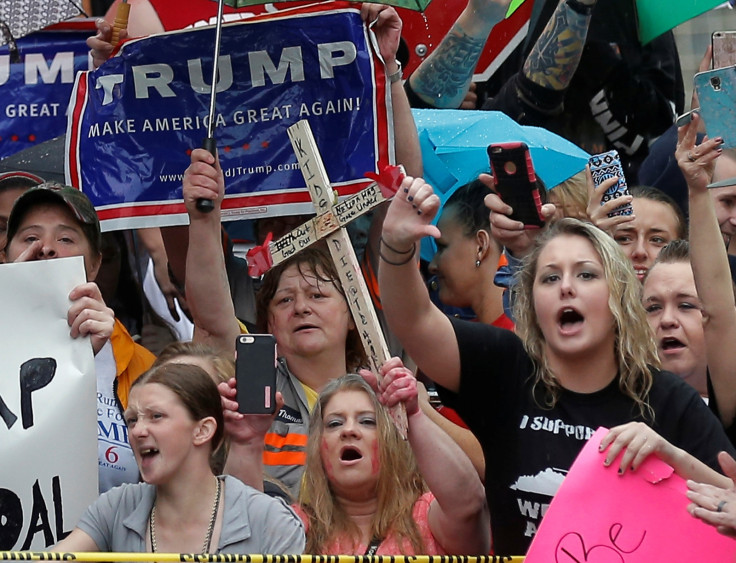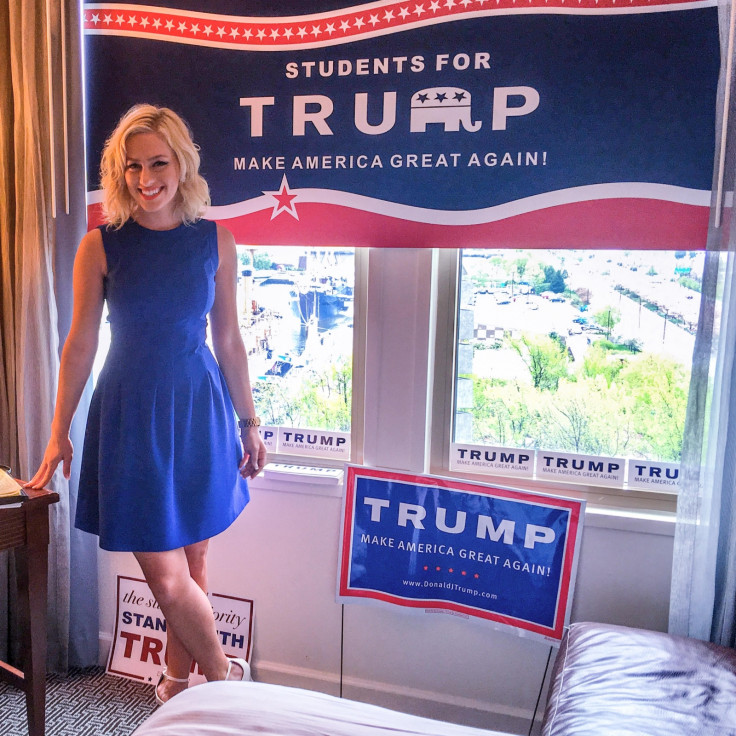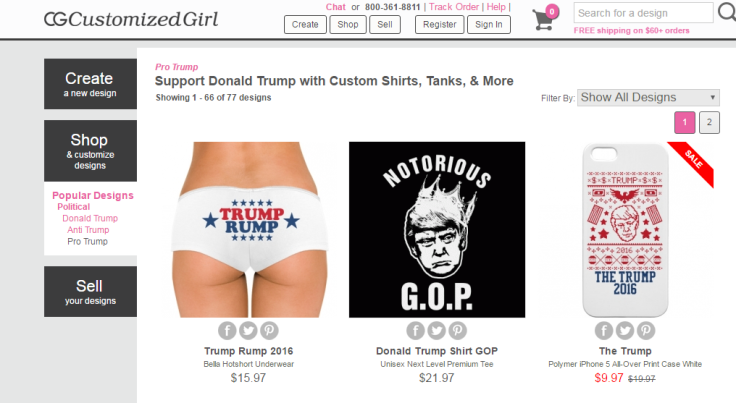Generation Trump: How Donald Trump's message reached beyond America's 'angry white men'

As a student in New Jersey, Sarah Hagmayer is used to raised eyebrows when she tells her friends that she supports Donald Trump. Millennials in NJ are all about Bernie Sanders, but Hagmayer, 20, has no time for the Democratic candidate's talk of peace and letting in Syrian refugees. She wants someone whose message isn't sugar-coated. She wants Donald Trump in the White House.
"When Donald Trump is speaking he just says what is on his mind, how he feels about it, and that is a major factor in why he has so much support, because so many people were absolutely disgusted with the political correctness that is taking over our nation and culture. He is just the real deal," said Hagmayer, a second-year business major at Rowans College in Philadelphia.
Hagmayer is spokesperson for Students for Trump, a 3,000-strong movement that is trying to mobilise millennials behind Trump ahead of the election in November. She isn't put off by the presumptive Republican candidate's disparaging comments about women over the months (and years), and chooses to "focus on the issues". Likewise his views on Muslims, and Latinos, which she sees as a focus on security and illegal immigration respectively.
"He has made a lot of so-called 'offensive comments' and a lot of women don't like him for that, but I don't think what he has to say should be taken to any personal regard. What he is saying is more about issues. For example [...] this idea that he hates Mexicans. It is not true, it is illegal aliens [which] cause a lot of problems in our country," she said.
Politics as unusual
Trump has at one point or another targeted Latinos, Muslims, women and journalists during his campaign to be the Republican nominee, while his rallies have often been marred with outbreaks of violence. This has served to alienate Americans on both the left and the right, but at the same time has found a resonance with millions of Americans that have turned their back on mainstream politics. For Hagmayer it is anger at safe spaces and the culture of political correctness on US campuses, for others it is a disillusionment with what America has become.
"Donald Trump is tapping into Americans who feel like the country as they know it is changing in front of their eyes. He has brought that into a broader political discourse. It is all about being angry at elites and being angry at governments," said Melissa Deckman, professor of political science at Washington College.

But where the traditional radical right has relied on Fox News and other outlets to garner support, Trump has thumbed his nose at them, declaring war on pundits that other Republicans would have bent over backwards to woo. The most notable case of this is in Trump's high-profile spat with Fox News anchor Megyn Kelly, who he has variously referred to as 'clueless' and 'a bimbo' via his Twitter account.
The fact is that Trump feels that he doesn't need the networks. His personal Twitter account has 8.4 million followers and even his most incomprehensible Tweets are more often than not picked up and splashed on the front pages of online and traditional media. His Facebook page has 7.8 million likes. Trump's outrageous statements bring in huge traffic for online media organisations, and so they cover them, and so he says more, and on it goes.
It could be that which candidate American voters consider the lesser of two evils ends up in the White House.
"Trump tweets something and he knows it will be splashed all over the internet within a half hour. He doesn't need the TV networks. It's been interesting the way he has turned his nose up at Fox because he has realised he can have this direct unmediated relationship with the public," said Duncan McDonnell of Griffith University in Brisbane, Australia, and co-author of Populists in Power.
But although the vessel is different – the explosion of social media being a fairly recent phenomenon – the audiences are not, explained Deckman. She points to studies that show that those who support Trump almost exclusively follow right-wing media outlets, be that Fox News or talk radio, Rush Limbaugh or social media: "The narrative is that government is corrupt and evil and can't do anything right: if all you have heard is that consistent refrain, of course [Donald Trump] makes sense," she said.
It is this cross section of the American public – made up, primarily, of angry white men and a smaller population of women – that finds solace in Donald Trump's nativist, anti-immigration message. But they are also attracted to his anti-free trade rhetoric, a new departure for the American right (which has traditionally been fiercely economically liberal) since it is the working poor that has been hit hardest by the financial crisis and its aftermath.
As for the young, most pundits believe that while young women in skimpy pro-Trump clothing plays well on social media, it is not a major demographic that Trump will be able to rely on come November. Those young people in the US who are sick of the politics-as-usual tend to be left wing, and tend to want to vote for Bernie Sanders. When, as expected, Sanders is beaten in the Democratic race, they will likely vote Hillary Clinton – or not vote at all.

Although Trump has made much of his desire to attract the white working poor in states such as Ohio and Pennsylvania – which Republicans have not won for a decade – he cannot become US president with the support of white voters alone. And it is little surprise, given his rhetoric, that Trump has a race problem. A massive 87% of African American voters and 83% of Latinos have a negative view of Trump.
This contrasts starkly with Hillary Clinton, who is exceptionally popular with black voters, even if her overall approval ratings – just like Trump's – are rock bottom. In 2016, it could literally be who American voters consider to be the lesser of two evils who ends up in the White House.
"For as many people as Trump is going to be able to bring in, he is going to galvanise and animate people who really oppose him to come out," said Deckman.
But Students for Trump's Hagmayer disagrees that it is only angry white men who turn out for Trump. She said that Students for Trump is a broad church: "We're a bunch of students – women and men - and we love Trump," she said.
Meanwhile on the popular website of US-based clothing retailer Customized Girl, Trump merchandise is selling well. For just under $16, female fans of the presidential hopeful can pick up skimpy white underwear emblazoned with patriotic stars and the message "Trump Rump". For just under $20, a similar garment channels the anti-immigration message that has been so central to the billionaire's rhetoric: 'Trump Train: Build the Wall".
Jeff Benzenberg, a spokesman for the site, is quick to point out that the clothing retailer is "politically agnostic", and stressed that the company stock anti-Trump t-shirts and caps too. He said the bulk of those buying politically-charged merchandise were women in their 20s and 30s, but conceded that by far the most popular products related to Sanders, rather than Trump.
"Obviously things have slowed down a bit on the Bernie side," he said, "but for a while there it was nothing but Feel the Bern this and Babes for Bernie that."
This is the first in a week-long series about Generation Trump by IBTimesUK.
© Copyright IBTimes 2025. All rights reserved.






















